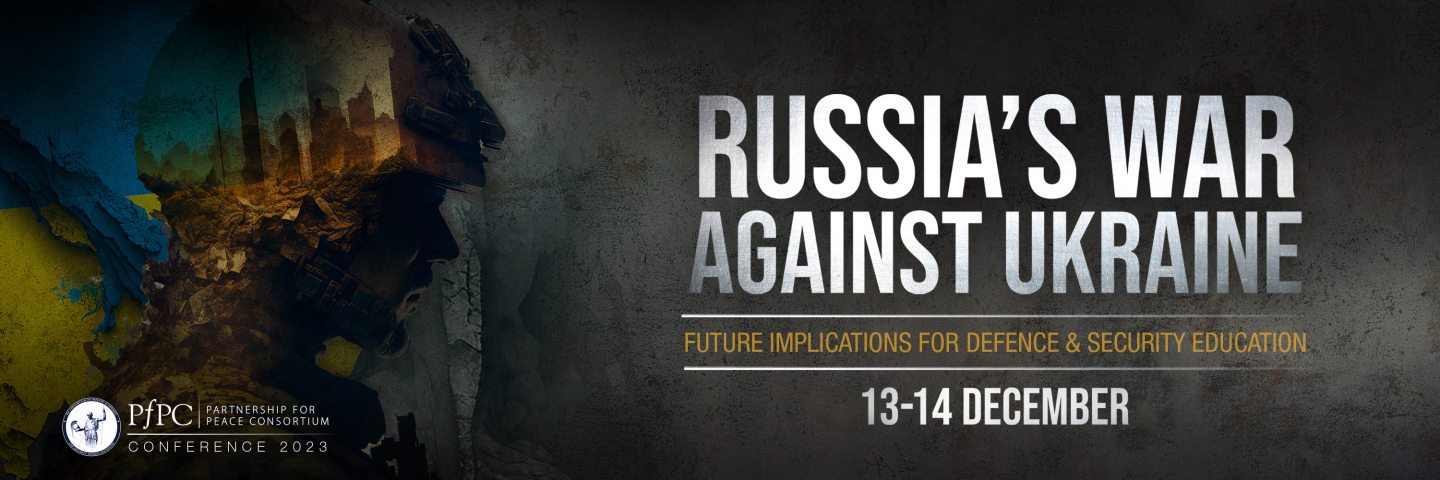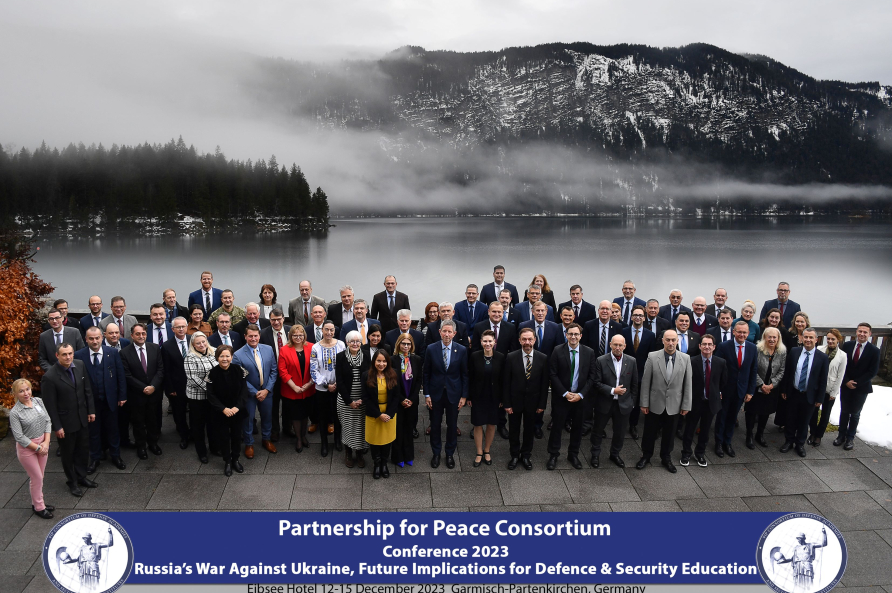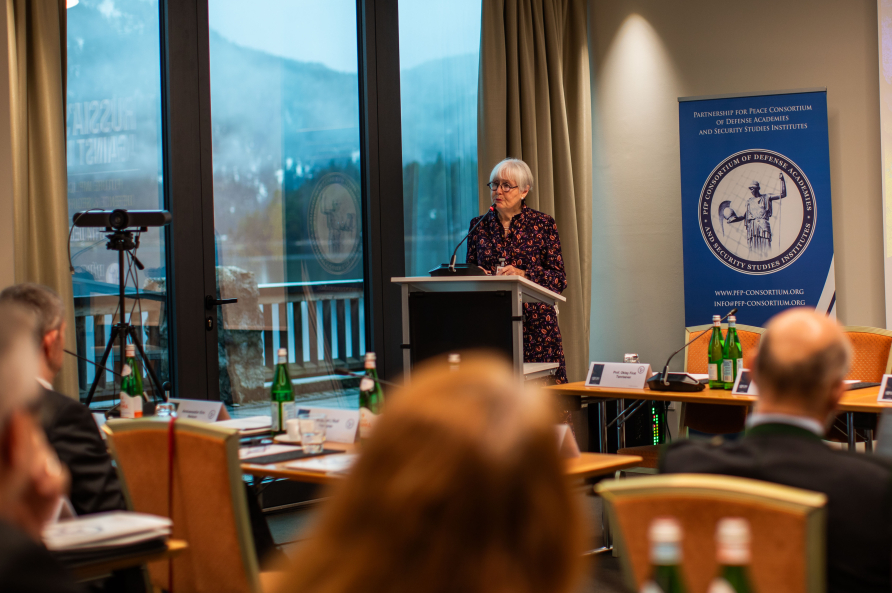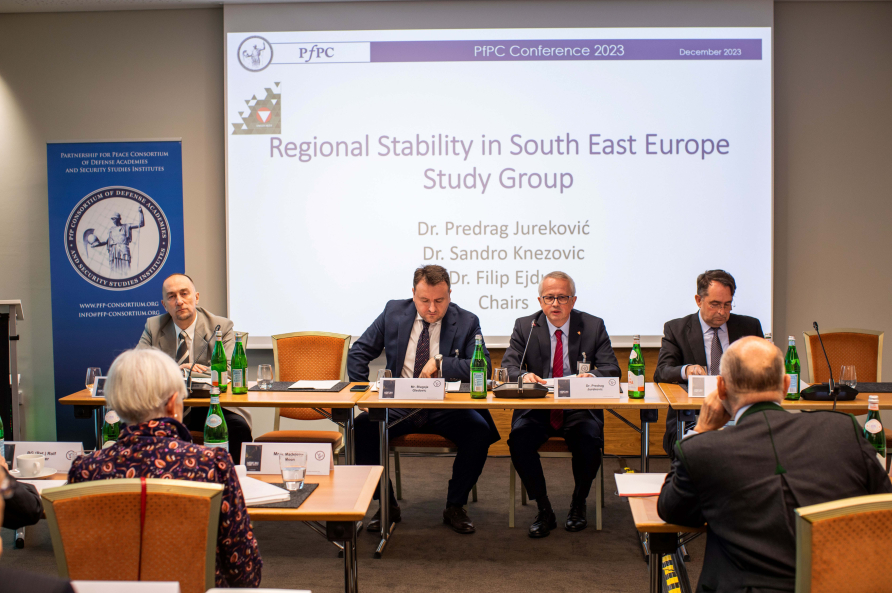
Partnership for Peace Consortium Comes Together for Conference at Eibsee
At the serene Eibsee in Grainau, Germany, the Partnership for Peace Consortium held a conference Dec. 13-14, providing a unique and insightful look into Ukraine's military strategies against Russian aggression.
Titled "Russia’s War against Ukraine – Future Implications for Defense and Security Education," the conference drew together over 75 participants from 60 defense education and security study organizations across 25 countries, delving deep into Ukraine's innovative approaches to military training and resilience.
"The PfP Consortium Conference 2023 is important for two reasons," said PfPC Chair and German Deputy Director at the Marshall Center retired Brig. Gen. Rolf Wagner. "It allows working and study groups to collaborate on a joint effort and gives them an opportunity to learn about each other's efforts while commenting critically on the body of knowledge each group is generating.”
In the evolving landscape of global defense and security, recent developments in Ukraine provide critical insights into modern warfare tactics and strategies. These insights are particularly valuable for the multinational defense community. Drawing upon a range of expert analyses and discussions, the security community can piece together a comprehensive understanding of lessons learned from Ukraine's response to Russian aggression and its broader implications.
In his opening remarks, Todor Tagarev, Minister of Defense of Bulgaria, said that instability in nations point to the value of larger defense budgets, which have grown over the last decade. This highlights the importance of defense education, he said.
“We need to make sure to educate officer and senior defense civilians who will be able to guide, direct and manage resources in the defense establishment even in political uncertainty… The objective should be to educate people, senior military and civilians in a way that they would be ready and willing to change the system when there is a requirement.”
Central to the discussions at the conference was Ukraine's strategic use of NATO training, which underscored the deployment of agile mobile defense units and the integration of advanced technologies such as anti-tank systems and Unmanned Aerial Systems. The evolving role of non-commissioned officers, adapting to the dynamic warfare environment, was highlighted, alongside the significance of resilience in both military and civilian spheres. These discussions also illuminated the transformative potential of innovations in military training, particularly the shift towards e-learning and the application of Artificial Intelligence, which hold significant implications for modern warfare.
One of the most important lessons learned in Ukraine, Tagarev said, is the use of technology.
“Not only is technology important but the speed with which technology is introduced into the battlefield is very important. Both sides are making the best efforts to adapt to what the other is doing.” Tagarev continued.
Innovations in Military Training and Adaptations
Ukraine's conflict scenario has also accelerated innovations in military training and medical response. The shift towards e-learning platforms and technology-enhanced solutions in military medicine underscores the need for adaptable and innovative training methodologies in conflict situations. These developments have broad implications for the DoD, suggesting a need for greater flexibility and the incorporation of advanced technological tools in training and operational planning.
The integration of Artificial Intelligence in military training and operations has emerged as a significant trend.
For the presentation on AI, Margaret Korosec, Dean of Online and Digital Education at the University of Leeds, explained the common reaction to AI in education.
“The first response was, oh no, my students will cheat,” she said. “Yes, it’s out there,” but, she added, let’s embrace AI and how it can revolutionize learning.
Sae Schatz, founder and CEO of The Knowledge Forge, and panel chair of the AI working group, said, “There will never be a future time when there is less AI in military training. Now is the time to invest in AI training before being left behind.”
AI's potential to enhance learning experiences, improve training efficiency, and provide critical insights into personnel readiness marks a new era in military training and exercises. The strategic importance of AI in operational planning and decision-making processes cannot be overstated, as it offers transformative possibilities in areas ranging from predictive analytics to automated systems management.
Geopolitical Dynamics and Security Implications
The conflict in Ukraine also sheds light on the broader geopolitical dynamics and security implications in regions like the Black Sea and the Western Balkans.
Marshall Center professor Yevgeniya Gaber, in her presentation, pointed out that what happens in the Black Sea does not stay in the Black Sea. "Not reacting to Russian aggression in the Black Sea would also legitimize China’s own expansionist goals in the Indo-Pacific. This is how we shape the future of the different regions."
Understanding the strategic challenges in these areas is crucial for global security planning and policy formulation. The situation in Ukraine illustrates the complex interplay between regional conflicts and global security, underscoring the importance of adaptive and nuanced approaches in defense and security education.
Madeleine Moon, former President of the NATO Parliamentary Assembly, said in her keynote speech, “Politicians, and to some extent I would say the military, were complacent. We had grown used to peace. There were no big ideas, no reviews. It was business as usual. It was hubris. Which is why this meeting here today is so timely.”
Russia's war in Ukraine underscored the need for increased Western support to resolve long-standing conflicts, notably between Bosnia and Herzegovina, and Kosovo and Serbia. It highlights the necessity to adapt and evolve educational frameworks in response to these emerging geopolitical realities.
The concept of resilience has been pivotal in Ukraine’s defense strategy. Discussions on Ukraine's mobilization strategies, integration of civilian forces, and adaptation of national infrastructure highlight the effectiveness of resilience in modern warfare. The role of societal unity, national identity, and volunteerism in bolstering both military and civilian resilience efforts points to the need for comprehensive strategies that encompass various aspects of society and governance.
The conflict has also brought into focus the role of emerging technologies in shaping future warfare. The strategic implications of advancements in military hardware, software, and tactics are profound, necessitating a reevaluation of current military doctrines and preparedness strategies. These technologies not only enhance operational capabilities but also redefine the nature of conflict, requiring a rethinking of defense strategies at the national and international levels.
Another critical aspect highlighted by the conflict is the weaponization of global interdependencies. In an increasingly interconnected world, understanding the complexities of global networks and developing strategies to mitigate associated risks is essential. This aspect of modern warfare emphasizes the need for comprehensive security policies that address the multifaceted nature of global interdependencies.
Moon believes that some countries are still thinking in terms of the battlefront of wars in the past.
“That is dangerous,” she said, citing the weaponization of things like energy, water, food supplies, cyber attacks, disinformation and financial instability, with AI overlaying everything.
“In war, big ideas require change, they require new partnerships, and can’t be limited to military, government and security organizations,” Moon said. “Security sector leaders have to reach out across society so that everyone in society has a stake in a successful outcome.”
Implications for the Future of Defense Education
These insights provide valuable lessons for future defense strategies and military education. The need for innovation, adaptability, and collaborative learning is more pronounced than ever in the face of contemporary challenges. The DoD can leverage these insights to enhance preparedness, operational efficiency, and strategic planning. Additionally, the importance of multinational defense education and security cooperation is underscored, highlighting the benefits of shared knowledge and experiences in shaping effective defense strategies.
The lessons drawn from Ukraine’s defense against Russian aggression offer a window into the complexities of modern warfare and its implications for global security. For the broader defense community, these insights are invaluable in shaping future defense strategies, policies, and educational programs. The need for a proactive, adaptable, and collaborative approach in defense planning and execution is evident, as is the importance of integrating technological innovations and understanding the global geopolitical landscape. As the defense landscape continues to evolve, these lessons will be instrumental in guiding the development of robust and effective defense strategies for the United States and its allies.
As a consortium of defense education and security studies institutes, this collaborative environment not only fosters a deeper understanding but also drives the evolution of defense education to meet contemporary challenges effectively.
The Partnership for Peace Consortium is a multinational network of defense academies and security studies institutes united by the core principles of the Partnership for Peace program. Its mission is to promote defense education and facilitate multinational solutions to security challenges in the Euro-Atlantic community.


